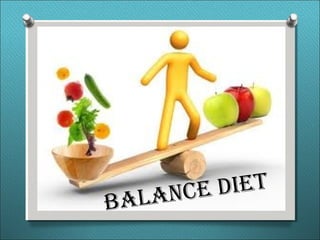
The Importance of a Balanced Diet and Dietary Fibre
- 1. Balance Diet
- 2. Dietary fibre (roughage) •Dietary fibre consists mainly of cellulose that is indigestible because we do not have enzymes to digest it. •Fruits and vegetable are rich in dietary fibre. •Importance of dietary fibre: a.Provides bulk to the intestinal contents. b.Stimulates peristalsis (rhythmic muscular contractions passing along the digestive tract) •Lack of dietary fibre in the diet leads to constipation (failure to pass motions)
- 3. Water •Water is a very essential for life because 60% to 70% of our body weight is water. •We can survive for several weeks without food but would be die in a few days without water. •Importance of water: a.Act as a solvent in which chemicals dissolve b.Acts as a transporting agent for digested food, excretory products, hormones and antibodies. c.Takes part in biochemical reactions (for example, digestion)
- 4. d. A major component of blood, body fluids, digestive juices and urine. e. Regulates body temperature by evaporation of sweat from the skin. •We require at least 1.5 litres of water daily to replace water lost in sweat, urine faeces and exhaled air.
- 5. The Importance of a Balance Diet •Diet refers to the food we eat. •A balance diet is a diet that contains all the seven classes of food in the right amount. •The amount of food or energy that a person needs depends on several factors: •Age – a teenager needs more food, especially proteins than an old man who is no longer growing. •Body size – people with bigger body sizes require more energy than those with smaller body sizes. •Sex – males require more energy than females because males have a smaller amounts of fatty tissues in their body. Thus, heat loss is faster in males than in females.
- 7. •Occupation – a person who does heavy work needs much more energy than a person who is only moderately active.
- 8. •Climate – people living in cold countries lose more heat to their surrounding compared with those living in the tropics. They need more energy in order to maintain their body temperature.
- 9. •State of health – a person suffering from hyperthyroidism (over activity of the thyroid gland in the neck) requires more energy. •The amount of food eaten must balance the quantity of energy used. If we eat too much, we will gain weight and become obese. If we eat too little, we will lose weight. Feel weak and may suffer from difficiency diseases.
- 10. Food Pyramid
- 11. Calorific value of food •The energy content of food is indicated by its calorific or energy value. •Carbohydrates, fats and protein supply us with energy. •The energy value of food is measured with a calorimeter. •The unit of energy in food can be measured in calories (cal) or joules (J) where 1 cal is equals 4.2 J. 1 cal = 4.2 J
- 12. Class of food Energy value (kJ g⁻₁ Carbohydrates 17 Proteins 18 Fats 39 Energy value of carbohydrates, proteins and fats
- 13. Foodstuff Carbohydr ates (g) Protein (g) Fat (g) Energy value (kJ g⁻₁ Rice 78.0 7.1 1.1 1508 Potato 18.9 2.0 0.1 344 Bread 51.3 7.2 1.8 1029 Refined sugar 100 0 0 1626 Composition and energy value per 100 g of foodstuff
- 14. Margarine 0.4 0.6 81 3024 Cow’s milk 5.0 3.5 3.5 273 Fresh anchovies 0 17.9 1.1 344 Dries anchovies 0 46 3.0 937 Crab 2.0 18 1.5 395
- 15. Food Quantity Energy value (kJ) Egg 1 medium size 300 White bread 1 piece 400 Cornflakes ½ cup 200 Doughnut 1 piece 300 Curry puff 1 piece 180 Fried rice 1plate 3000 Fried noodles 1plate 2200 Rice 1plate 2800 Chicken rice 1plate 2000 Banana 1 piece 400 Full cream milk 1 glass 680
